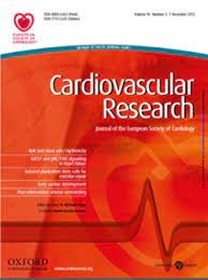急性心肌梗死和卒中呼吸道病毒触发因素的系统回顾和荟萃分析
IF 13.3
1区 医学
Q1 CARDIAC & CARDIOVASCULAR SYSTEMS
引用次数: 0
摘要
呼吸道病毒感染可引发急性心血管事件。然而,相对的病原体特异性关联知之甚少,限制了最佳的预防建议。本研究的目的是系统地回顾呼吸道病毒与急性心肌梗死(AMI)和中风两种主要结局之间的关系。我们检索了MEDLINE, PubMed, Embase, Cochrane和Web of Science,从数据库建立到2024年8月26日。通过实验室确认测试确定的呼吸道病毒的分析性流行病学研究,涉及任何国家任何年龄的人类参与者,符合纳入条件。采用Cochrane协作方法评估偏倚风险。采用随机效应模型对来自质量和同质性足够的研究的数据进行汇总。对每一个确定的病毒触发因素的证据的确定性进行了评估。在确定的11017篇文章中,我们纳入了1978年至2024年间发表的48篇研究。所有研究均为观察性研究,其中28项适合定量合成。有中等确定性证据表明流感可引发急性心肌梗死(发病率比,5.37;95% ci, 3.48-8.28;I2 = 69.4%)。我们发现高确定性的证据表明流感引发中风——流感与感染后28天内中风风险增加4.7倍相关(发病率比,4.72;95% ci, 3.78-5.90;I2 = 0%)。SARS-CoV-2和巨细胞病毒可引发卒中,SARS-CoV-2、呼吸道合胞病毒和柯萨奇B也被确定为AMI的潜在诱因。在这项系统回顾和荟萃分析中,研究结果表明,常见的呼吸道病毒感染(通常是疫苗可预防的)与急性心血管事件的风险增加有关。本文章由计算机程序翻译,如有差异,请以英文原文为准。
Systematic review and meta-analysis of respiratory viral triggers for acute myocardial infarction and stroke
Respiratory viral infections may trigger acute cardiovascular events. However, relative pathogen-specific associations are poorly understood, limiting optimal preventive recommendations. The aim of this study was to systematically review the association between respiratory viruses with two primary outcomes, acute myocardial infarction (AMI) and stroke. We searched MEDLINE, PubMed, Embase, Cochrane, and Web of Science, from database inception to 26 August 2024. Analytical epidemiological studies of respiratory viruses identified by laboratory-confirmatory testing, involving human participants of any age in any country, were eligible for inclusion. Risk of bias was assessed using the Cochrane Collaboration approach. Data from studies of sufficient quality and homogeneity were pooled using a random-effects model. Certainty of the evidence was assessed for each identified viral trigger. Of 11 017 articles identified, we included a total of 48 studies published between 1978 and 2024. All were observational studies, of which 28 were suitable for quantitative synthesis. There was moderate-certainty evidence that influenza triggers AMI (incidence rate ratio, 5.37; 95% CI, 3.48–8.28; I2 = 69.4%). We found high-certainty evidence that influenza triggers stroke—influenza was associated with a 4.7-fold increased risk of stroke within the first 28 days following infection (incidence rate ratio, 4.72; 95% CI, 3.78–5.90; I2 = 0%). SARS-CoV-2 and cytomegalovirus may trigger stroke, while SARS-CoV-2, respiratory syncytial virus, and Coxsackie B were also identified as potential triggers for AMI. In this systematic review and meta-analysis, the findings suggest that common, often vaccine-preventable, respiratory viral infections are associated with an increased risk of acute cardiovascular events.
求助全文
通过发布文献求助,成功后即可免费获取论文全文。
去求助
来源期刊

Cardiovascular Research
医学-心血管系统
CiteScore
21.50
自引率
3.70%
发文量
547
审稿时长
1 months
期刊介绍:
Cardiovascular Research
Journal Overview:
International journal of the European Society of Cardiology
Focuses on basic and translational research in cardiology and cardiovascular biology
Aims to enhance insight into cardiovascular disease mechanisms and innovation prospects
Submission Criteria:
Welcomes papers covering molecular, sub-cellular, cellular, organ, and organism levels
Accepts clinical proof-of-concept and translational studies
Manuscripts expected to provide significant contribution to cardiovascular biology and diseases
 求助内容:
求助内容: 应助结果提醒方式:
应助结果提醒方式:


